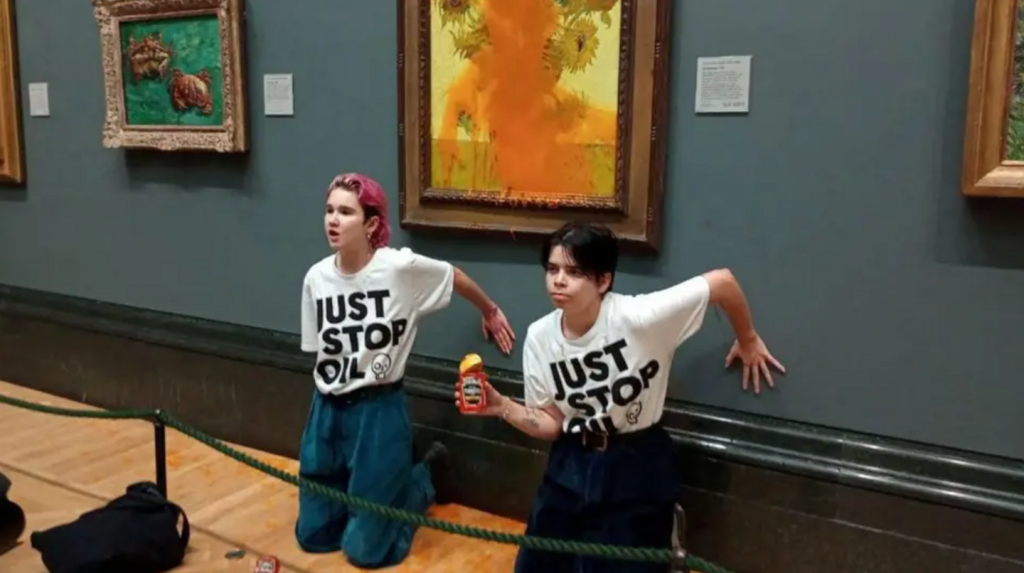Activists Target Van Gogh Paintings with Soup in Latest Protest
3 min read

In a dramatic display of climate activism, members of the Just Stop Oil movement have thrown soup over two Vincent van Gogh paintings at the National Gallery in London. This incident occurred just hours after two activists were sentenced for a similar act targeting one of the same artworks, emphasizing the group’s commitment to raising awareness about climate change.
On this occasion, three protesters—two women and a man—deliberately splashed an orange soup onto Van Gogh’s Sunflowers 1888 and Sunflowers 1889, which are part of the Poets and Lovers exhibition. The activists have since been arrested on suspicion of causing criminal damage.
This latest protest follows the sentencing of Phoebe Plummer, 23, and Anna Holland, 22, who received two years and 20 months in prison, respectively, for their actions in October 2022 when they targeted Sunflowers 1888. Their sentences reflect the increasing legal consequences faced by activists as they employ increasingly bold tactics to draw attention to their cause.
The National Gallery confirmed that the paintings affected during the recent protest were immediately removed for examination but reported that they were found to be undamaged. This outcome is significant for the gallery, as it indicates that while the protest aims to create a stir, the artworks themselves remain intact.
Witnesses described a tense atmosphere as the activists executed their plan. As they threw the soup, onlookers shouted in disapproval, urging them to stop. Footage shared by Just Stop Oil on social media captured the activists addressing a crowd, proclaiming, “There are people in prison for demanding an end to new oil and gas, something which is now government policy after sustained, disruptive actions, countless headlines, and the resulting political pressure.”
The activists further asserted that “future generations will regard these prisoners of conscience to be on the right side of history,” framing their actions within a broader narrative of moral righteousness. This rhetoric reflects a growing trend among climate activists to position themselves as part of a historical struggle against injustice.
The Metropolitan Police confirmed that they apprehended the three individuals involved in the soup-throwing incident and stated that their inquiries were ongoing. The police response highlights the legal ramifications of such protests, particularly as they become more frequent and disruptive.
This incident marks the third time in recent years that artworks at the National Gallery have been chosen as targets for protest actions. The frequency of these events raises questions about the relationship between art, activism, and public perception. While the activists aim to provoke a reaction and spur discussion on climate issues, they also face backlash from art lovers and the general public who may view their tactics as damaging or disrespectful.
The National Gallery, a prestigious institution, has become a focal point for these types of protests, reflecting a broader movement among climate activists to use high-profile platforms to amplify their messages. By targeting well-known artworks, activists aim to attract media attention and generate public discourse around pressing environmental issues, often at the expense of traditional norms surrounding public art.
As discussions around climate change become increasingly urgent, the strategies employed by activists like Just Stop Oil will likely continue to evolve. Some argue that such confrontational tactics are necessary to break through the noise of everyday life and make climate issues impossible to ignore. Others, however, question whether these methods alienate potential supporters and detract from the important message of climate action.
In the aftermath of this latest incident, both the National Gallery and Just Stop Oil find themselves at the center of a heated debate about the effectiveness and ethics of protest. As legal proceedings unfold for the activists involved, the conversations sparked by their actions will undoubtedly continue to resonate, challenging both the public and policymakers to confront the pressing realities of climate change.